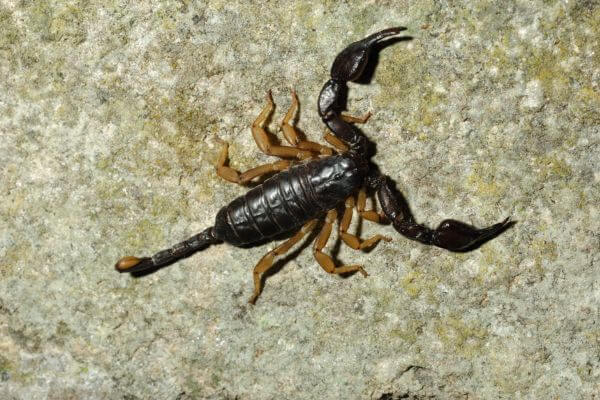Scorpions are feared and unwanted arachnids in many regions of the world. Their presence can pose a health and safety risk, especially when they break into our homes. In this article, we will discuss effective measures to control and prevent the presence of scorpions in your home. With these strategies, you will be able to keep your home free of these arachnids and ensure the safety of your family.

Knowing and Identifying Scorpions
Before addressing control measures, it is important to know a little more about these arachnids. They belong to the Arachnida class and can vary in size, color and behavior depending on the species. They are often found in hot and dry areas, where they can adapt and survive in diverse environments.
There are several species of scorpions, but not all pose a significant risk to humans. It is important to correctly identify domestic scorpions in order to adopt appropriate control measures. Here are the most common domestic species:
In the US they are:
- Emperor Scorpion (Pandinus imperator): Although native to Africa, it is commonly kept as a pet in the United States.
- Fat-tailed Scorpion (Hadrurus spp): These scorpions are found primarily in the southwestern United States and are popular in terrariums.
- Rock scorpion (Centruroides spp): These species are found in various regions of the United States, such as the Texas scorpion (Centruroides vittatus) and the Arizona scorpion (Centruroides sculpturatus).
In South America, some common domestic scorpion species include:
- Yellow Scorpion (Tityus serrulatus): It is a very common species in Brazil, especially in the Southeast and Midwest regions.
- Brown Scorpion (Tityus bahiensis): Also found in Brazil, it is more common in the northeast and midwest regions.
- Amazon scorpion (Tityus obscurus): It is found mainly in the Amazon region, including countries such as Brazil, Colombia, Peru and Ecuador.
In Europe, scorpions are not native to all regions, but there are some species that can be found in certain areas:
- European yellow scorpion (Euscorpius flavicaudis): It is found in countries such as France, Italy, Spain and Portugal.
- European Black Scorpion (Androctonus australis): Although most common in North Africa, it can also be found in southern Spain.
In Asia and Africa, there is a great diversity of scorpion species, many of which are not considered domestic. However, there are some common species that are found in these regions:
In Asia:
- Asian Fat-tailed Scorpion (Heterometrus spp): These species are common in several Asian countries such as India, Thailand, Malaysia and Indonesia.
- Golden Scorpion (Mesobuthus martensii): Found mainly in China, it is used in scientific research and in traditional Chinese medicine.
- Malay scorpion (Lychas mucronatus): This species is found in Southeast Asian countries such as Malaysia, Thailand and the Philippines.
In Africa:
- Black Scorpion (Hottentotta spp): These species are found in various parts of Africa such as South Africa, Namibia and Morocco.
- African yellow scorpion (Parabuthus spp.): This species is common in regions of sub-Saharan Africa, including countries such as South Africa, Kenya and Tanzania.
- Desert scorpion (Androctonus spp.): Found mainly in desert regions of North Africa, such as Morocco, Egypt and Libya.
In Oceania:
There are a variety of species found on different islands and regions. Some common scorpion species in Oceania include:
- Australian Scorpion (Urodacus spp): They are found in various parts of Australia. Notable species include Urodacus yaschenkoi and Urodacus elongatus.
- New Guinea Fat-tailed Scorpion (Liocheles australasiae): Found in tropical areas of New Guinea and adjacent islands.
- Pacific Island Scorpion (Opisthacanthus cayaporum): Found on some islands in Micronesia, including the Marshall Islands and Palau.
- Vanuatu Fat-tailed Scorpion (Liocheles sp): Found on the islands of Vanuatu in the South Pacific.
Keep in mind that the ownership of arachnids as pets can vary according to local regulations and it is important to obtain detailed information about the specific species before considering them as pets. Additionally, care and expert knowledge is critical when dealing with scorpions due to their potential venom.
Preventive measures
Prevention is the best way to control the presence of scorpions in your home. There are simple measures that can be adopted to avoid infestation of these arachnids. Here are some effective strategies:
- Garden cleaning: Keep the garden well maintained, avoiding the accumulation of leaves, branches and other debris that can serve as a hiding place for scorpions. Pruning the vegetation close to the house also helps to reduce the presence of these arachnids.
- Sealing gaps and cracks: Check for gaps and cracks in walls, floors and baseboards. These openings can serve as entry points for scorpions. Carry out the necessary repairs to seal them.
- Protective screens: Install screens on windows, doors and drains to prevent scorpions from entering your home. Make sure the screens are in good condition, with no tears or flaws.
- Cleaning and organization: Keep your home clean and free of debris, such as piles of wood, stones and building materials. Scorpions can find shelter in these places.
Control measures against Scorpions
If you identify the presence of scorpions in your home, it is important to adopt control measures to eliminate or remove these arachnids. See some options:
- Use of insecticides: In cases of severe infestation, the use of specific insecticides for scorpions may be necessary. However, it is important to follow the instructions for use and safety of the product, ensuring that it is applied properly and avoiding unnecessary exposure.
- Traps: Traps can be effective in capturing these animals and preventing their proliferation. There are different types of traps available in the market, from sticky traps to baited traps. Position them in strategic locations where the presence of scorpions has been observed.
- Maintenance of external areas: In addition to taking care of the internal cleaning of the house, it is also essential to keep the external areas free of debris, such as accumulated leaves, loose stones and construction materials. This helps prevent scorpions from finding shelter near your home.
- Hiring professional services: In more serious or persistent cases, it is recommended to seek help from companies specializing in pest control. These professionals have the right knowledge and techniques to deal with scorpion infestations, ensuring an effective and safe solution.
Information about Scorpion Stings
Despite all prevention and control efforts, it is still possible to get a scorpion sting. It is essential to be prepared and know the first aid measures in case of a bite. Wash the area with soap and water, apply a cool compress to reduce swelling, and seek immediate medical attention. Inform the professional about the occurrence of the bite and follow the specific guidelines for proper treatment.
By adopting effective prevention and control measures, it is possible to keep your home free of the unwanted presence of scorpions. Proper cleaning and organization, sealing gaps and cracks, using protective screens and maintaining the garden are simple but effective strategies to avoid infestation by these arachnids. However, if the infestation persists or is very serious, it is recommended to seek help from specialized pest control professionals.
Remember that prevention is always the best approach, and awareness of risks and protective measures is key. Stay informed about the scorpion species present in your area and be prepared to act appropriately if a sting occurs. With these measures, you will be able to enjoy a safe and scorpion-free environment in your home. Protect your home and keep your family safe by implementing scorpion control strategies consistently and efficiently.
Education and Awareness
In addition to practical prevention and control measures, education and awareness are essential tools in dealing with the scorpion issue. It is important to disseminate information about these arachnids so that people can take appropriate action in their homes and communities. Some initiatives include:
- Awareness programs: Promote lectures, workshops or educational campaigns in schools, community centers and local associations, addressing the risks associated with scorpions and the preventive measures to be adopted.
- Disclosure of information: Use media such as websites, blogs and social media to share relevant information about scorpions. Explain about the habits, characteristics and risks associated with these arachnids, as well as effective measures to control them.
- Partnerships with government agencies: Establish partnerships with local health and environmental authorities to promote joint actions to control and prevent scorpions. Such cooperation may include carrying out and cleanup efforts, distribution of educational materials and implementation of monitoring programs.
Controlling scorpions in the home requires a comprehensive approach, involving prevention, control and awareness measures. By adopting simple strategies, such as maintaining cleanliness, sealing gaps and cracks, using protective screens and taking care of the external environment, it is possible to significantly reduce the presence of these arachnids.
However, it is important to emphasize that, in severe or persistent cases of scorpion infestation, it is essential to seek the assistance of professionals specialized in pest control. They have the right knowledge and techniques to handle the situation effectively and safely.
Also remember the importance of education and awareness to ensure ongoing prevention. By disseminating information about scorpion risks and control measures, you contribute to the safety of your community and help prevent problems related to these arachnids.
Protecting your home and family from scorpions takes effort and commitment, but by implementing the proper measures, you will be providing a safe and peaceful environment. Stay informed, take the necessary measures and share knowledge. Together, we can keep our homes free of these arachnids and ensure everyone’s well-being.

